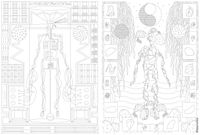THE HUMAN BEING AS A GARDEN
Far Eastern medicine sees the human body more as a garden. This is in contrast to modern western medical and philosophical models, which, since the Enlightenment, have tried to explain it in terms of a machine. This view was held by René Descartes (cogito ergo sum, I think therefore I am), among other thinkers. Very much a child of his time, Descartes and his contemporaries were keen to make man into a machine. The Enlightenment was moving forward at the same time as the industrial revolution, and for the first time, the strength and capacity of the human body was being replaced on a large scale by the power of machines. The difference was obvious, so there was a need to find a new view and philosophy of the human body, in contrast to the imperatives of the church, which, in the darkness of the Middle Ages, was limited to the idea of original sin. Despite the good intentions, however, the baby was sometimes thrown out with the bath water. A lot of alternative medicine was rejected and regarded as humbug, although held dear by many people, and history has often shown this to be a mistake. However, much was corrected along the right lines, and has subsequently been enlightened by modern science.
Fortunately, today's medicine has increasingly integrated the oriental view that man is not a machine into its thinking. It’s important to remember that the history of traditional Chinese medicine does not take a smoothly running common thread through the years, with no muddle or confusion. Numerous schools, scholars and doctors have argued and fought over its development, finding similarities, sense and nonsense. Its long and great tradition has its own endemic science, and is often all too quickly and unfairly criticized by supposedly superior Western views.
A garden has a range of beds, with flowers, shrubs and bushes, with vegetables and herbs here, and large and small trees there. Each with its own individual qualities and peculiarities which need to be nurtured and cared for. But all of them need earth, minerals, sun, air and water. There it may be too damp and here too dry; here too hot and there too dark. A challenge for every gardener or nature lover, the right environment and conditions have to be created for each and every species, so they can all thrive, despite their diversity. Add the correct amount of water to the channels, or drain them at the right time. Nothing should be allowed to drown or dehydrate, freeze or burn. The human organism and spirit need similar care. Both need nourishment and purification at the right time; you harvest the consequences of your care. Water moistens the earth, and together with the sun and wind form the basis, the foundation. Between them, the right relationship is essential for success.
Our emotions are similar to the weather and can affect the mood and atmosphere in the garden. Gloomy weather or sunshine can prevail, with long winters, calm fogs and wild winds. If only one kind of weather prevails, some plants will suffer while others will dominate. It all depends on the right mood and atmosphere. Let’s take care of our garden as well as we possibly can. As the Daoists say:
Come, be beautiful as the flowers, then leave again.
